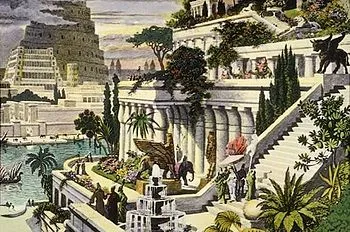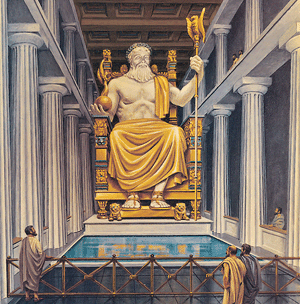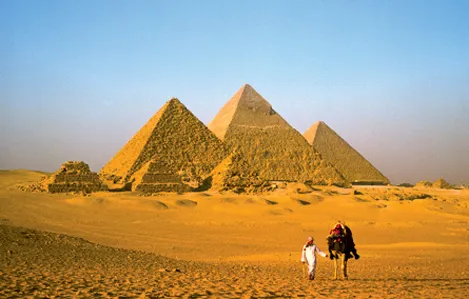Historian Herodotus and the wise Kalimacos are known to have made this list at the Museum of Alexandria. The list was made in the list - Giza's Great Pyramid, Hanging Gardens of Babylon, statue of the Greek goddess of Olympia, Temple of Artisius in Ephesus, Tomb of Hellenicus, Colossus of Rhodes, and Lighthouse of Alexandria. Giza's Pyramid in this list only survives.
In 2011, a new list of the world's newest wigs was made. Bangladesh also hoped that the Cox's Bazar and the Sundarbans were built. Although these two places were not selected in the final list. Let's go, we all know about the winner in the new list. Today we will talk about the old list of the seventeenth century people whose stories have been heard from the ages, even after some place on that list does not exist. Historians Herodotus and Kalimakos of Knowledgeable Kalimakos make this list in Alexandria's museum, but there is no trace of the manuscripts of their original list. The list was made in the list - Giza's Great Pyramid, Hanging Gardens of Babylon, statue of the Greek goddess of Olympia, Temple of Artisius in Ephesus, Tomb of Hellenicus, Colossus of Rhodes, and Lighthouse of Alexandria. Giza's Pyramid in this list only survives.

Source
1) Hanging Gardens of Babylon
The actual location of this mythical garden in the ancient Wonders list has not been ascertained till date. It is said that it was located in the city of Babylon (now near the city of the city of Allah, in the province of Babylon) in Iraq. A man named Josephus from the book of Bersusus, a priest of Babylon, said in 290 BC, Nebuchadnezzar of Neo-Babylonian King made this hanging garden (605-562 BC) during his reign. Unfortunately, there is no unbelievable documentary evidence in support of this statement, and archaeologists have not found any traces or remains of this park near Babylon. It is assumed to be inadequate evidence, that the hanging garden of Babylon is actually a legend, and nothing else.
2) Artemis temple
This temple is made for the worship of the Greek god Artemis. Its location was in Ephesus, currently near Seljuk city of Turkey. Until 401 AD the temple was completely destroyed, the temple was reinforced three times at different times. It is believed that the foundation stone of this holy temple is laid in the Bronze era. In the seventh century BCE, it was completely destroyed by a devastating flood. Later, in 550 BC, the project to rebuild this temple was undertaken under the supervision of Critan architect Chereficron and his son Metageness, which lasted ten years. Meanwhile, the temple is attacked by the Herodotus, and the whole temple is set on fire. Later it was rebuilt. There is not much room available at present. Researchers have discovered the location of this temple for 60 years. Finally in 1869 John Turtle Wood and his investigative team found the ruins of the temple. Some archaeological sites derived from that area of the temple are preserved in the British Museum.

Source
3) Statue of Greek god Zeus of Olympia
The Greek deity of Zeus was about 42 feet tall. 430-422 BC it was built by Greek architect Fidias. It was set up in a holy place in Olympia of Greece, after which the temple of Zeus was built. The gold, other precious stones and elephant teeth are said to have been on a wooden structure. But in the fifth century, it was destroyed. No other replica of the statue was found, and its description is available only in the old Greek manuscripts and metallic currencies.
4) Lighthouse of Alexandria
It was also sometimes called Alexandra's "Light house", which was built during the reign of the Ptolemy Dynasty (280-24 BC), far away from Alexandria in Egypt, Faros, a remote island off the coast. The purpose of this lighthouse was to guide sailors into the sea port. This lighthouse from 390 to 450 feet was standing in the heart of the world for many centuries as the highest set of man-made structures. The lighthouse was severely damaged by three earthquakes that took place between 956 AD and 1323 AD. In 1480, the stone blocks of this lighthouse were used to construct the city of Quetube. In 1994, a group of French archaeologists Alexandria found some ruins of the lighthouse in the eastern harbor.
5) Large statues of Colosse of Rhodes or Rhodes Island
This statue is built in honor of the great Greek Titan soldier Helios. Chase of Lyndon The statue in Rhodes Island on Rhodes Island, Greece, on the outskirts of Rhodes, built the statue in order to keep the statue remembered for the defeat of the son of Monopthanas in the reign of the King of Antigenas-I. This war took place in 305 BC. This image of 43 meter height was one of the tallest statues in the world until the earthquake of 220 BC was destroyed.
6) The tombstone of Hellkirnas
This tomb was built 353-350 BC Mujulas and his wife Artemisia, a provincial governor of the Persian Empire. It is designed by Greek architect Cyrats and Piusius of Prince. The tomb was 45 meters high, and its four edges, respectively, created four Greek architects - Leoquis, Braxis, Scope of Parrose and Timothy II. Its aesthetic beauty impresses everyone so much that it is ranked in the seventh list of the ancient world. Some of its ruins are now preserved in the British Museum.

Source
7) Great Pyramid of Giza
The oldest of the oldest in the middle of the seven wings is still standing still in Egypt's "El Giza" According to Egypt's ancient history experts, it was built in the 5th century BC by the Pharaoh of Egypt, the fourth Pharaoh or the king of the pharaoh dynasty. The 146.5 meter pillar pillar has been recognized as a man-made maximum structure for more than 3800 years. Nowadays it is one of the interesting places for tourists.